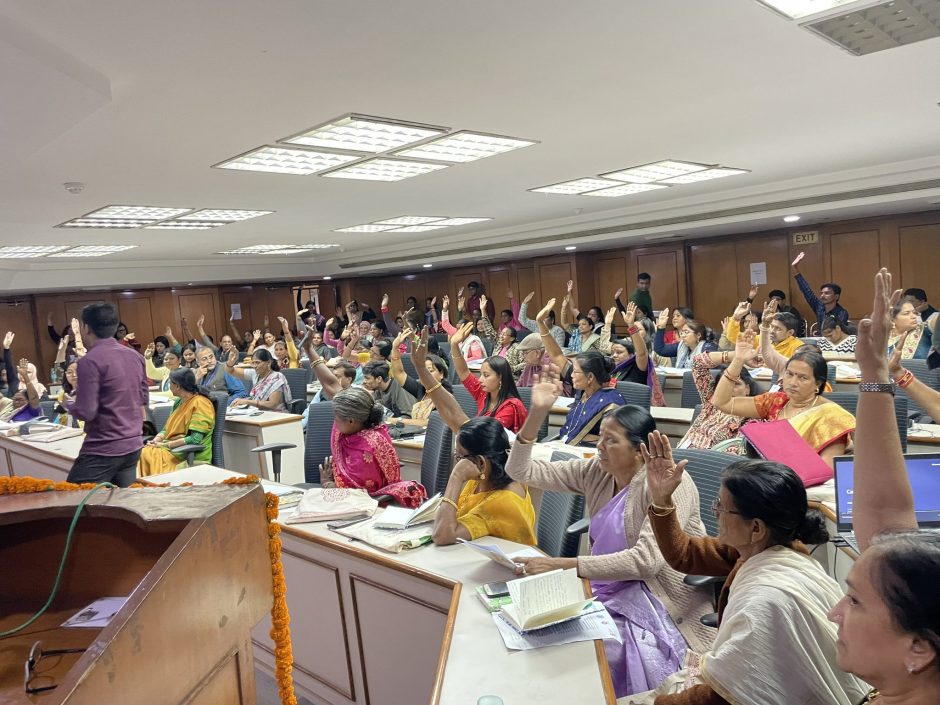SEWA Cooperative Federation held a national workshop in Delhi on 13-14 December to celebrate its 40th anniversary. Over 100 women co-operators from 18 states across India attended the event, which was co-organised by SEWA, the National Co-operative Union of India (NCUI) and ICA Asia-Pacific (ICA-AP).
Themed Strengthening Solidarity: Enabling Women’s Cooperatives and Collective Enterprises to Thrive, the workshop explored issues around access to finance, the ease of doing business, marketing, governance, capacity-building and digital inclusion.
As it closed, the event adopted a declaration making a series of recommendations to strengthen women’s co-ops and women’s leadership within the co-operative movement.
One of SEWA’s main commitments in the declaration is to continue to organise women, particularly those in the informal economy, into co-operatives. The apex also promises to continue linking women with government programmes and support services to support their economic empowerment.
Another pledge is to keep providing access to affordable financial services for women, including working capital and insurance. Alongside this, SEWA will continue to offer financial literacy and management training to women co-operators to help them grow their businesses.
Another important area of work for SEWA is co-operative education and the federation intends to keep educating women workers on the co-operative values and principles while building social solidarity. To this end, SEWA will continue to provide capacity-building and leadership programmes for women co-operators while developing a network of grassroots trainers and providing opportunities for peer-to-peer learning and digital literacy.
The largest section of the declaration includes suggestions and commitments around advocating for appropriate laws, policies and programmes that promote women’s co-operatives and collective entrepreneurship. To this end, SEWA pledges to collect gender-disaggregated, state-wide data and co-operatives and share this with state and national authorities to enable co-operative-to-co-operative trade.
The apex also calls for a simplification of the registration procedures for co-operatives engaged in non-traditional economic activities, and the development of new compliance and reporting systems through a consultative process with women co-operators.
Across the two days, women co-operators highlighted the urgent need to simplify the registration process for women’s co-operatives. Renana Jhabvala, president of SEWA Bharat and Padma Shri Award winner, pointed out that it can take a year and a half to set up a women’s co-op under the Cooperative Act, while registering under the Company Act takes only a month.

“There is a need to look at the matter and make the process easy,” she told the meeting.
Other measures suggested in the declaration include a tax exemption for women’s co-op with a turnover of up to Rs20 crore (£1.98m), developing a women’s co-operative enterprise development fund, ensuring that the autonomy of co-ops and co-op federations is recognised and protected, and supporting the digitisation of women’s co-operatives. The declaration also demands increased representation for women on co-op boards.
The event also heard from ICA-AP president Chandra Pal Singh Yadav, who addressed the lack of female representation on some co-op boards, calling on women to “fight elections” rather than restricting themselves to competition for all-women reserved seats.
With the G20 taking place in India this year, SEWA’s declaration highlights the importance of linking women’s co-operatives and their federations with the G20 processes, showcasing their contributions to the Indian and global economy and facilitating preferential procurement from co-operatives, including export orders.
Over the course of the two days women’s co-ops attending the workshop were able to sell their products at a dedicated Women Cooperatives Bazaar within the NCUI premises, which served as the venue for the workshop.
The declaration was presented to the national committee set up by the Indian government to develop a new national co-operative policy. SEWA says it hopes the committee will include the recommendations in the national co-operative policy, currently in development.

